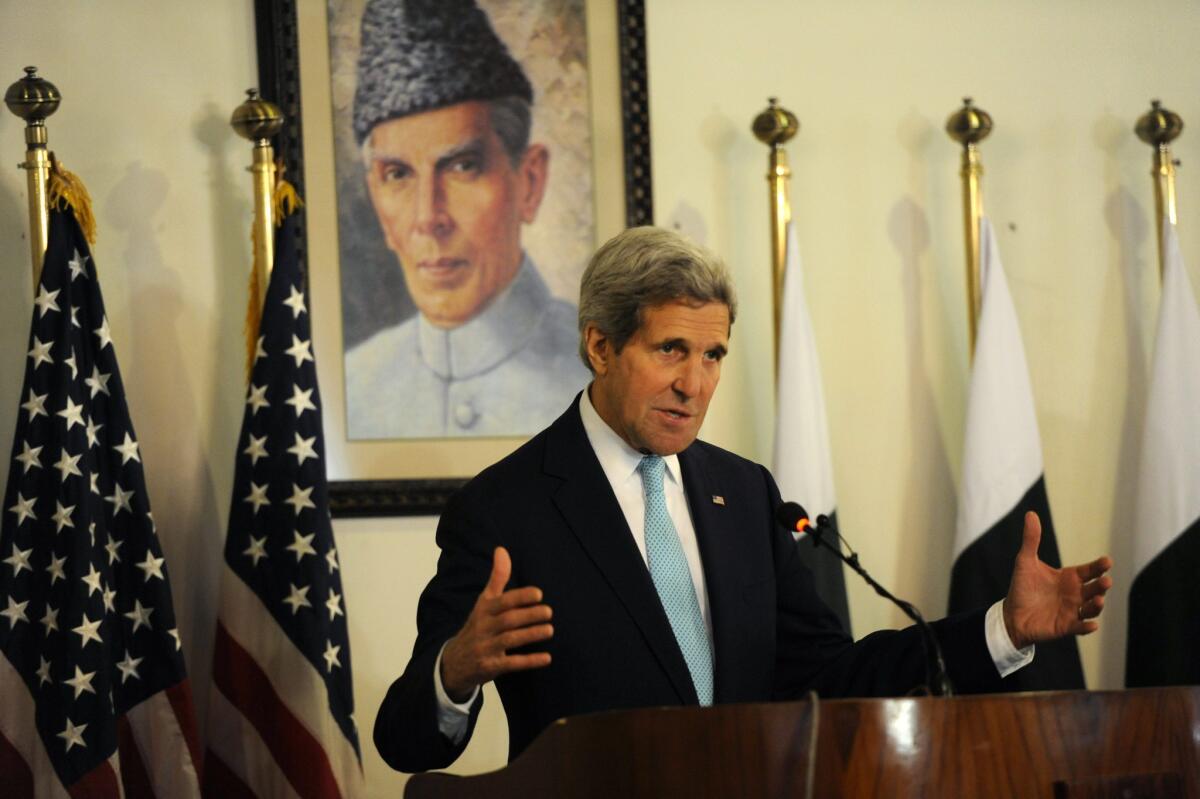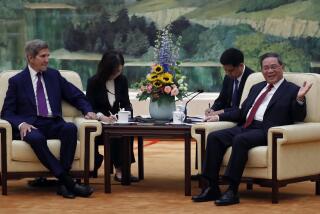Kerry urges Pakistan to keep up fight against militants

- Share via
Reporting from Islamabad, Pakistan — Secretary of State John F. Kerry offered qualified praise Tuesday for Pakistan’s military operation in the northern tribal region, calling it “a major initiative” to combat insurgents carrying out attacks across the border in Afghanistan.
“We have urged Pakistan for some period of time to engage in an operation that would begin to target the western part of the country, the tribal areas, and they have done so,” Kerry said during a two-day visit to Islamabad, the capital.
Kerry said it was too soon to judge the success of Pakistan’s months-long offensive focused in the North Waziristan tribal area. However, he credited military leaders for a “very extensive” effort to weaken the Afghan Taliban, the Haqqani network and other groups that have attacked U.S. and coalition forces in Afghanistan.
Pakistan has long been accused of tolerating and even supporting proxy militant groups sowing chaos in Afghanistan. But since the deadly raid by Pakistani Taliban insurgents on a school in Peshawar last month that killed 133 students and 16 staff members, officials say they will no longer differentiate between “good” and “bad” insurgents.
In meetings with senior Pakistani officials, Kerry said he emphasized the need to eliminate insurgent sanctuaries from which an array of militant groups have plotted attacks in both Afghanistan and Pakistan.
“I think it’s sufficient to say that the events of Dec. 16 [in Peshawar] may well have changed the range of options with respect to those sanctuaries, and that is something that will be discussed and developed over the course of the next weeks and months,” Kerry said.
Kerry’s visit came as the U.S. troop presence in Afghanistan has shrunk to about 10,600 soldiers who are focusing on training Afghan forces, creating new urgency for Obama administration efforts to promote talks between Taliban insurgents and the new government in Kabul. Analysts say that Pakistan’s military establishment must put pressure on the Taliban’s Pakistan-based leadership to come to the negotiating table.
Kerry said the U.S. welcomed efforts by Pakistani Prime Minister Nawaz Sharif and Afghan President Ashraf Ghani to cooperate against militants and refresh a long-troubled relationship.
State Department officials said the U.S. would earmark $250 million of previously approved aid to Pakistan to help rehabilitate the areas affected by the North Waziristan offensive. Pakistan says its operation has cost $2 billion and that it has appealed to countries for financial support.
Pakistani national security advisor Sartaj Aziz said at a joint news conference with Kerry that Pakistani forces have cleared insurgents from 85% to 90% of North Waziristan, but that operations were ongoing.
Kerry also urged Pakistan and India to return to peace talks that were scuttled last year by Indian Prime Minister Narendra Modi after a Pakistani diplomat met with a controversial Indian separatist group. The two countries have recently traded fire along their disputed boundary, with each accusing the other of violating a cease-fire.
“It is profoundly in the interests of Pakistan and India to move their relationship forward,” Kerry said.
Aziz said that since India called off the talks, it was up to New Delhi to resume dialogue. He called on the U.S. to “play its role in resolving the issues with India for regional peace and prosperity.”
Kerry later met senior military commanders, including army chief Gen. Raheel Sharif, in Rawalpindi to discuss joint military efforts and plans for greater intelligence sharing.
Military spokesman Asim Bajwa tweeted that Kerry and Sharif, who is not related to the prime minister, discussed wide-ranging issues, including regional security and stability.
Special correspondent Sahi reported from Islamabad and Times staff writer Bengali from Mumbai, India.
For more news from South Asia, follow @SBengali on Twitter
More to Read
Sign up for Essential California
The most important California stories and recommendations in your inbox every morning.
You may occasionally receive promotional content from the Los Angeles Times.














